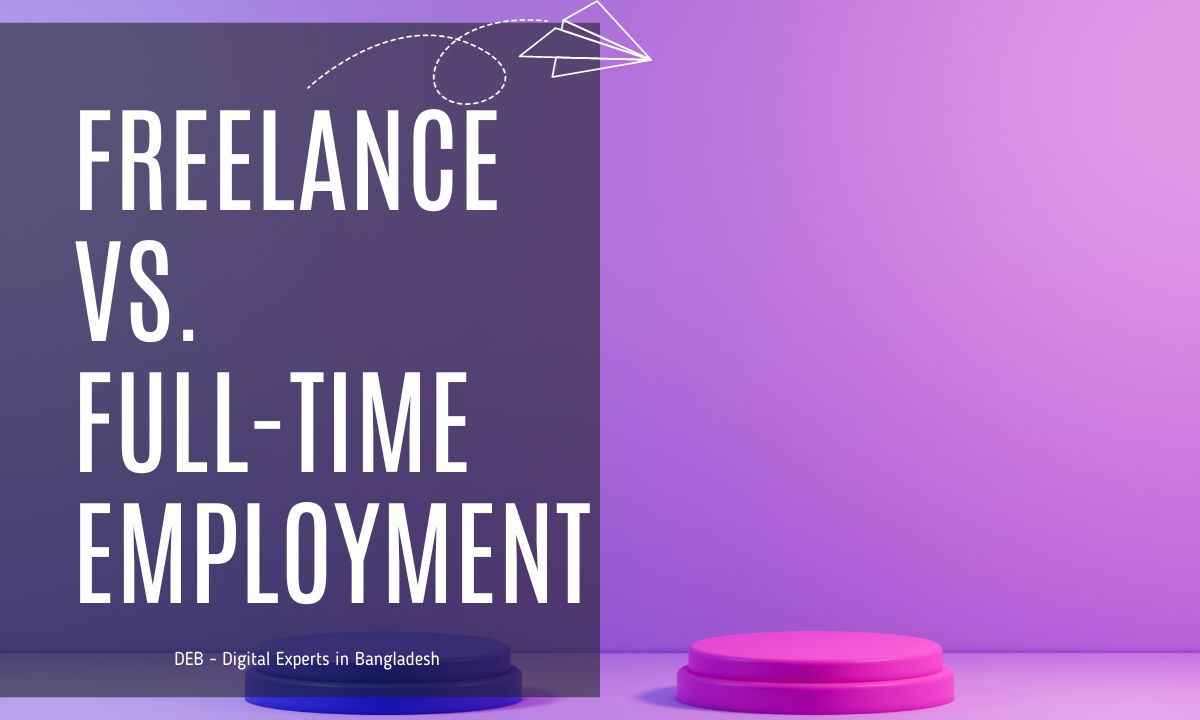Freelance and full-time employment offer different benefits and challenges. Freelancing allows for freedom and flexibility, while full-time employment provides stability and benefits.
Whether you choose freelance or full-time employment depends on your personal work style, financial needs, and career goals. We will explore the key differences between freelance and full-time employment, helping you make an informed decision about which option is right for you.
So, let’s dive in and explore the world of freelancing and full-time employment to see which path aligns best with your individual preferences and aspirations.
Exploring The Benefits And Challenges Of Freelancing
Freelancing offers a range of benefits as well as challenges. One of the main advantages is the flexibility of schedule and location. Freelancers have the freedom to choose when and where they work, allowing them to create a better work-life balance. This flexibility also enables them to take on multiple projects and clients, increasing their potential for higher income. Freelancing also allows individuals to build a diverse portfolio, as they have the opportunity to take on a variety of projects and gain experience in different industries.
However, freelancing also comes with its challenges, primarily related to income. Freelancers often face irregular income and instability, as their workload and pay can vary greatly from month to month. This requires careful financial planning and budgeting. Additionally, freelancers need to manage their own taxes, healthcare, and retirement planning, which adds another layer of responsibility.
Overall, freelancing provides flexibility and potential for higher income, but it also requires individuals to navigate and overcome the challenges of irregular income and instability.
Advantages And Disadvantages Of Full-time Employment
Full-time employment offers stability and consistent income. With a regular paycheck, employees have a greater sense of financial security. This can make it easier to plan for the future and meet monthly expenses without worrying about irregular income.
Additionally, full-time employees often enjoy various employer benefits and perks. These can include health insurance, retirement plans, paid time off, and professional development opportunities. These benefits can greatly contribute to overall job satisfaction and well-being.
However, one disadvantage of full-time employment is the limited control over work hours. Most full-time positions require employees to adhere to a set schedule, which can limit flexibility in managing personal and professional commitments.
Furthermore, while full-time employment provides stability, it may not always offer the potential for rapid career growth and professional development. Employees may need to navigate organizational hierarchies and wait for opportunities to advance.
Factors To Consider In Making The Ultimate Career Choice
The decision to choose between freelance and full-time employment is a personal one, influenced by various factors. One important factor to consider is personal preferences and work style. Some individuals thrive in a structured corporate environment, while others prefer the flexibility and autonomy that comes with freelancing.
Financial considerations and stability requirements also play a significant role in the career choice. Freelancers often have a fluctuating income and need to manage their finances accordingly, whereas full-time employees enjoy a more predictable salary.
Long-term career goals and aspirations should not be overlooked when making this decision. Freelancing offers the opportunity to pursue diverse projects and gain experience across different industries. On the other hand, full-time employment provides a sense of stability and the opportunity for career growth within a single company.
Finally, evaluating risk tolerance and self-discipline is crucial. Freelancing requires self-motivation, discipline, and the ability to handle uncertainty, whereas full-time employment offers a more structured and stable work environment.
Comparing Job Security And Stability
The job market has seen a surge in freelance work in recent years. With the rise of the gig economy, many professionals are opting for freelance positions that offer flexibility and autonomy. However, in a volatile job market, freelance work can be unpredictable and heavily reliant on client relationships. Depending on short-term contracts and project-based work can lead to a lack of job security. On the other hand, full-time employment provides stability and steady income. Being a permanent employee gives you a sense of security and the assurance of a regular paycheck. While freelance work may offer more freedom and flexibility, the stability and steady employment that comes with a full-time position cannot be overlooked. It ultimately depends on a person’s preferences and risk tolerance.
Balancing Work-life Integration And Work-life Balance
Freelance and full-time employment offer different opportunities and challenges when it comes to work-life integration and work-life balance. As a freelancer, managing work hours and boundaries is crucial to ensure a healthy work-life balance. Setting clear boundaries and creating a structured schedule can help freelancers separate work and personal life, avoiding burnout and maintaining productivity.
On the other hand, full-time positions may pose challenges in maintaining work-life balance. In traditional employment, the expectation of working certain hours and being available at all times can blur the lines between work and personal life. Finding ways to establish boundaries, such as prioritizing tasks and learning to delegate, can be essential when striving to achieve work-life balance in a full-time job.
Ultimately, identifying the right fit between freelance and full-time employment depends on an individual’s lifestyle needs. Freelancing offers flexibility and autonomy, allowing individuals to design their work-life integration. Full-time positions can provide stability and benefits but may require stronger boundary-setting skills. Understanding personal priorities and values is key to making the right choice.
Self-motivation And Accountability In Freelancing
Freelancing requires a high level of self-motivation and accountability. As a freelancer, it is essential to maintain productivity and focus to ensure success and meet client expectations.
Managing deadlines is a critical aspect of freelancing. Freelancers must organize their time effectively to complete tasks on time and deliver quality work to clients.
Another important aspect of freelancing is maintaining client expectations. Freelancers must communicate regularly with clients to understand their requirements and provide updates on the progress of the work. Clear communication and meeting client expectations are crucial for establishing long-term relationships.
Personal responsibility and discipline are essential characteristics of successful freelancers. Freelancers must have the discipline to manage their time, set goals, and hold themselves accountable for their work. Being self-motivated and proactive in seeking new opportunities is also essential for sustaining a freelance career.
The Importance Of Networking And Building Connections
Networking and building connections are crucial elements for both freelance and full-time employment. Social media and online platforms provide freelancers with a vast pool of potential clients and opportunities. By leveraging these platforms effectively, freelancers can showcase their skills, connect with like-minded professionals, and establish a strong online presence.
In full-time employment, professional networks play a significant role. Colleagues, industry events, and online forums offer opportunities to collaborate, learn, and explore new career prospects. Building a broad network of contacts can foster career growth and enhance job security.
Networking has a direct impact on career growth and job security. By connecting with industry leaders, professionals can gain valuable insights, access job openings, and receive recommendations. Additionally, networking allows individuals to stay informed about market trends and industry advancements, keeping their skills relevant and in demand.
Whether freelancing or working full-time, developing and nurturing connections is essential for long-term success in the business world.
Understanding The Legal And Administrative Aspects
Understanding the legal and administrative aspects is crucial when comparing freelance and full-time employment. Freelancers are responsible for managing their own taxes, insurance, and legal obligations. They must be diligent in keeping track of their income, and expenses, and filing taxes accordingly. Obtaining appropriate insurance coverage is essential for protecting their business while complying with any legal obligations, such as registering as a self-employed professional, is necessary to avoid any legal issues.
In contrast, full-time employees typically have their taxes and insurance taken care of by their employer. They receive a regular paycheck with taxes withheld and may have access to company benefits like health insurance and retirement plans. While they have fewer administrative responsibilities, full-time employees still have legal rights and obligations related to employment contracts, working hours, and workplace safety.
Navigating the administrative complexities of both freelance and full-time employment requires careful attention to detail and an understanding of the legal requirements. Each career path has its unique challenges and rewards, and individuals should consider their personal preferences, financial stability, and long-term goals when deciding between freelance and full-time employment.
Considering The Future Of Work And Industry Trends
Considering the Future of Work and Industry Trends
With the evolving job market and increased demand for freelancers, it is essential to assess the advantages and disadvantages of freelance work versus full-time employment. Technological advancements have significantly shaped employment opportunities, creating new avenues for freelance professionals. Freelancing offers the flexibility to work on multiple projects simultaneously, providing a diverse range of experiences and exposure. It allows individuals to adapt their skills to different industries, driving personal and professional growth. Freelancers have the freedom to choose their clients and work environment, which can result in a better work-life balance. However, to stay competitive in the changing landscape, freelancers must continuously upgrade their skills and keep up with industry trends. On the other hand, full-time employment provides stability, benefits, and a predictable income. It also offers the opportunity for career progression within a specific company or industry.
Making The Ultimate Career Choice: Factors To Weigh
Making the ultimate career choice between freelance and full-time employment requires evaluating and comparing personal preferences and priorities. It is essential to weigh the pros and cons of both options to make an informed decision. Freelancing offers flexibility in terms of working hours and location, allowing individuals to be their own bosses. However, it may lack stability and job security. On the other hand, full-time employment provides regular income, benefits, and career growth opportunities. Yet, it may restrict flexibility and impose fixed working hours. To make an informed decision, seeking advice and insights from professionals in both fields can be beneficial. Their experiences and perspectives can shed light on the realities of working as a freelancer or a full-time employee.
Frequently Asked Questions For Freelance Vs. Full-time Employment
Is Freelance Better Than A Full-time Job?
Freelancing can be better than a full-time job because it offers flexibility, independence, and higher earning potential. With freelancing, you can choose your own projects and working hours, and there’s no limit to how much you can earn.
Is It Better To Work As A Freelancer Or Employee?
Working as a freelancer or employee depends on personal preferences and circumstances. Freelancing offers flexibility and independence, but employees have stable income and benefits. Consider your work style, financial needs, and desired work-life balance when making this decision.
How Are Freelancers Different From Full-time Employees?
Freelancers work independently, not as full-time employees. They have flexible schedules and choose their projects. Full-time employees work for a single employer on a fixed schedule. Freelancers have more freedom and control over their work, while full-time employees have job security and benefits.
What Are The Disadvantages Of Freelancing?
Disadvantages of freelancing include inconsistent income, lack of job security, difficulty in finding clients, managing finances, and no employee benefits.
Conclusion
Ultimately, whether to choose freelance or full-time employment depends on your unique circumstances, preferences, and goals. Both options have their pros and cons. Freelancing offers flexibility and independence, while full-time employment provides stability and benefits. Consider factors such as income stability, work-life balance, job security, and personal aspirations when deciding between the two.
Make a choice that aligns with your personal and professional needs to ensure a fulfilling and successful career.

